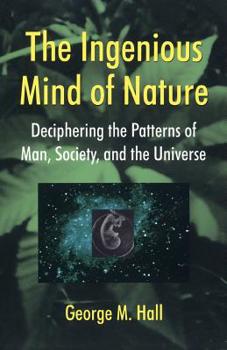The Ingenious Mind of Nature: Deciphering the Patterns of Man, Society, and the Universe
Select Format
Select Condition 
Book Overview
George Hall - teacher, historian, engineer, and computer analyst - uniquely draws upon the competing perspectives of traditional science, the exciting new science of chaos, and the burgeoning and important tenets of complexity theory, catastrophe theory, and fuzzy logic to look for a common theme. All of these perspectives, he finds, are fundamentally united by a common theme: the crucial patterns of elements and their dynamic change over time. Order - be it the growth of a fetus or the rumbling shift of continents - evolves because these patterns are themselves the blueprint and the "programs" by which nature shapes our awe-inspiring universe. Hall takes this elegant concept and carries it from the simplest phenomena to the most complex, including the evolution of the species. He then extends these concepts beyond the physical sciences, into the fascinating provinces of philosophy, computer programming, psychology, economics, political science, international relations, law, and ethics. In doing so, he tackles the challenging question of human behavior. Since we humans have initiative and can sometimes change the natural course of events, how can we find a system to understand our own actions and the workings of society at large? This captivating book explains the mechanics of change and provides a provocative concept that accounts for the growth and decline of all systems, be it the universe at large, the miracle of life on earth, or our own thought processes as we contemplate and unlock the mysteries around us. This evocative perspective on nature offers food for thought to general readers and scientists alike by illuminating the ingenious patterns that influence the course of humanity and the universe.
Format:Paperback
Language:English
ISBN:0738205842
ISBN13:9780738205847
Release Date:August 2001
Publisher:Westview Publishing
Length:464 Pages
Weight:1.09 lbs.
Dimensions:1.0" x 5.4" x 8.2"
Customer Reviews
1 rating
Cataloguing the Universe
Published by Thriftbooks.com User , 21 years ago
I picked up this book while passing it in the library. I thought it was a different book (Mind and Nature) but i was pleasantly surprised that it wasn't.This guy is a phenom! In this book, a bit technical, he outlines the domains of various sciences and their relationships to and between each other. It doesn't go into the detail and grime of specific books, nor is it a 'cross-discipline' analysis, rather it tells you how far disciplines are from each other! It's like a taxonomy of the universe and the university.I think this will help anybody make sense of the chaos we call a univeristy system. It helps you figure out exactly what people are studying and what they aren't studying. It would help if you've been through college and you still want to know what to do with your life because the information is technical, but it should be read by people going into college.If you ever wanted to know a little bit about a lot, this is the book.





